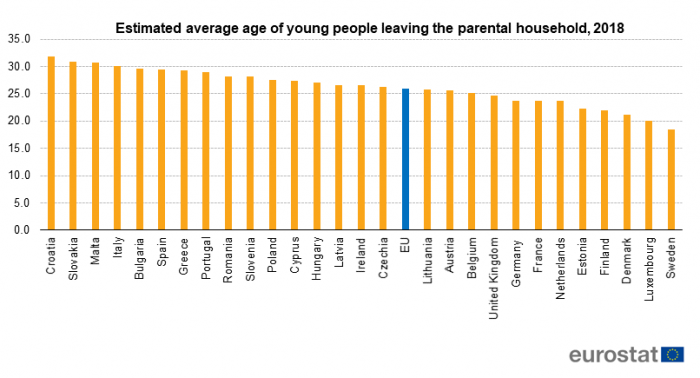Young Hungarian adults fly coop later than EU average

Eurostat
In 2018, some 42.2% of young Hungarian adults aged between 25 and 34 still lived in the same household as their parents, well above the European average, according to the European Unionʼs statistical agency Eurostat.
Chart: Eurostat
In the EU, more than one third (35.3%) of males aged 25-34 were still living with their parents, according to the latest data from 2017 and 2018, compared with only one fifth (21.7%) of females in the same age group. On average, around one young adult in four (28.5%) still lived in the parental home.
Across the EU Member States, the share of young people aged 25-34 still living with their parents varied greatly. The rate was the lowest in northern countries such as Denmark (3.2%), Finland (4.7%), and Sweden (6.0%), while the rate was higher than 50% in Croatia (59.7%), Slovakia (57.0%), and Greece (56.3%).
Eurostat says that that on average, young people left the parental household at the age of 26 years in the Member States, with great differences between countries in this case as well.
Among the EU members with the lowest age of young people leaving the parental nest, the average age was 18.5 years in Sweden, 21.1 years in Denmark, and 22 years in Finland. The average age was also extraordinarily low in Luxembourg (20.1 years). Young people also tended to leave before the age of 25 in Estonia (22.2 years), Germany, France and the Netherlands (all 23.7 years), as well as the United Kingdom (24.7 years).
By contrast, the average leaving age stood at 27.1 years in Hungary.
On the other hand, young adults in Croatia and Slovakia tended to remain the longest in the parental household; here, the average age of leaving home stood at 31.8 and 30.9 years, respectively. Young adults in Malta (30.7 years), Italy (30.1 years), Bulgaria (29.6 years), Spain (29.5 years), Greece (29.3 years), and Portugal (28.9 years) all stayed in the parental household for longer periods.
In nearly all EU countries, young women tended to leave the parental household earlier than men. The only exception was Sweden (18.5 years for women, 18.4 for men). The greatest differences between the genders were registered in Romania (25.6 years for women, compared with 30.5 for men), Bulgaria (27.5 vs. 31.7), Croatia (30.0 vs. 33.6), Greece (28.0 vs. 30.6), Hungary (25.8 vs. 28.3), Poland (26.3 vs. 28.8), Slovakia (29.7 vs. 32.1), and Lithuania (24.5 vs. 26.9).
SUPPORT THE BUDAPEST BUSINESS JOURNAL
Producing journalism that is worthy of the name is a costly business. For 27 years, the publishers, editors and reporters of the Budapest Business Journal have striven to bring you business news that works, information that you can trust, that is factual, accurate and presented without fear or favor.
Newspaper organizations across the globe have struggled to find a business model that allows them to continue to excel, without compromising their ability to perform. Most recently, some have experimented with the idea of involving their most important stakeholders, their readers.
We would like to offer that same opportunity to our readers. We would like to invite you to help us deliver the quality business journalism you require. Hit our Support the BBJ button and you can choose the how much and how often you send us your contributions.







